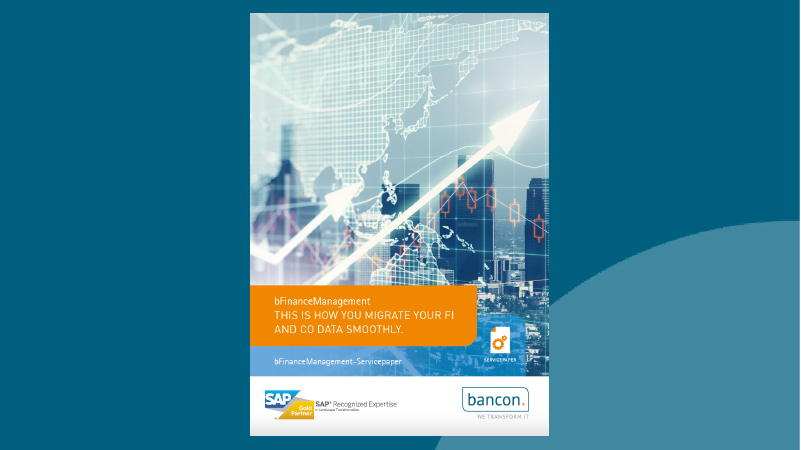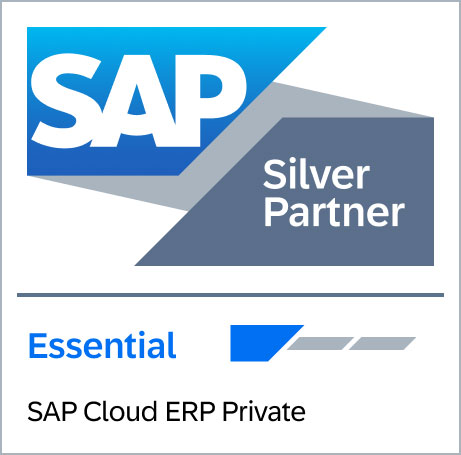- Services
Datentransformation
Transformation von Finanzdienstleistungen
Entwicklungsservices
- Kunden
- Über Uns
- Karriere
- Informationsmaterial
The following interview was first written for ERP Today of which a small portion was published online.
Whilst the current climate should expedite a CIO’s decision to upgrade or replace their ERP, in the short term it’s likely to do the opposite, even for those businesses less impacted by the pandemic. The sheer magnitude of uncertainty and unpredictability will inevitably deter many decision makers from taking decisive and immediate action. However, taking action now could allow businesses to gain considerable advantage over the competition who like many, will be facing organisational turmoil such as cash flow constraints brought on, or indeed amplified by the COVID-19 pandemic.
The advantage gained when introducing a new ERP project shouldn’t be underestimated. A defining decision that allows a business to transform, streamline and simplify their operating model. Allowing and empowering senior management to break old habits and begin the journey of adopting new, lean business processes that creates a better working environment in the process. Whilst there is never a bad time to consider an ERP project, making the bold decision now provides businesses with an opportunity to take advantage of a bad situation and emerge from the turmoil a more lean, competitive and data driven business than they were before.
Prior to COVID-19, many businesses couldn’t begin to imagine running complex projects with a remote work force. However, if we’ve learnt anything over the last four months it’s that Zoom, Microsoft Teams and WebEx have ensured business can indeed run just as smoothly without in-person interactions. The increased efficiency, productivity and cost savings as a result of not needing to travel, combined with the potential to negotiate lower day-rates and license deals, means this fear is really something of the past and businesses who embrace this ‘new normal’ will be the ones who thrive.
COVID-19 aside, why else should I consider an ERP project?
As an SAP partner I’m regularly asked by our clients, “When is the best time to take the plunge and transition to SAP S/4?” and to be honest, it’s always been an equally weighed answer for both stick or twist, until recently. Given the pressure to remain competitive has never been so high, I believe upgrading to S/4 should be considered sooner rather than later. For starters, at the turn of the year SAP made the welcomed decision to extend the support provided to S/4 customers until 2040. An anticipated announcement that provides customers with the assurance that making the decision to invest in S/4 demonstrates a clear value for the next 20 years at least.
Another recent shift is SAP now has a substantial user base on S/4, consisting of many established industry leaders such as the Toyota Motor Company, Microsoft and Nestle. It’s been a long time coming, but an important step that has in turn, created a flurry of interest from those previously unwilling to move to S/4 until a critical mass of other businesses had done the same. The most promising aspect of this is that S/4 customers are releasing valuable insight into how the update has directly contributed to increased efficiency and profit margins for their business, as well as providing real-time business insights for real-time decision making. These insights from respected industry leaders makes it easier for others to justify the spend and ratify business cases which were previously lacking in details regarding any potential return on investment.
Finally, the SAP system integrators and consultancies, are far more experienced in S/4 than they were several years back. Up until the turn of 2018, there was a history of project failures, however SAP has kept on top of their integration partner community to ensure that more recent high-profile S/4 projects have been successfully executed. This is an important development and one that could have seen SAPs investment into S/4 diminish if not solved within the timely manner of which it was.
Overall, there is great optimism within the community that the tide is starting to turn for S/4 adoption, which all stems from the fact that future customers finally have valuable insight to justify the investment, alongside an extended support period and reliable partner network. If businesses want to remain competitive, now would be the time to consider.
How can I sweat my ECC assets if I’m not ready for S/4?
I spoke with Wilfried Schulte, Managing Director of our South Africa division who shared his view, “You can do several things to extend the lifetime of your current ECC system and get a few more years of use while giving your business time to prepare for an S/4 move. One activity would be to clean up the master data and organisational structure of your ECC system by means of using System Landscape Optimisation (SLO) services from an expert company.
“As all your data would need to be transferred at a later stage to an S/4 system anyway, doing a clean-up beforehand is not only beneficial from an operational perspective, but it also puts your business in a strong and ready position for when you do decide you are ready for S/4, making it a worthwhile and protected investment. Besides being S/4 ready, it helps consolidate activities with your customers and suppliers and understand what business you are doing with each of them, in either role. Without this increased clarity, you could run the risk of missing out on valuable negotiating advantage, or worse giving large chunks of your business to your competitors.
“An example of this was a logistics company we worked with in South Africa. On the one hand, they were suppliers to an oil company, transporting and distributing their petrol across Africa, on the other, they were a customer, filling up their own trucks at the petrol stations. When the oil company released a tender looking for a new distribution partner, without a consolidated view of all business purchases and sales, showing just how valuable their relationship was, the logistics company ran the risk of losing the tender. That’s why, regardless of whether your organisation is “ready” for S/4 or not, cleaning up the master data and organisational structure of your ECC system is key for future proofing your business.
“Another alternative to consider, could be the technical upgrade of your current ECC system to Suite on HANA. This is merely a technical upgrade and doesn’t require a disruptive business project.
“The main advantage would be the increase in performance response time due to the HANA database underneath. It’s a fairly straightforward, simple update which allows the support team to become familiar with the HANA database without touching any integral business processes.”
Is now a good time to negotiate with my ERP vendor given the economic difficulties? The impending economic downturn provides the perfect backdrop for businesses to negotiate discounts with vendors, who’s sales force will still be encouraged to meet optimistic targets set prior to the Coronavirus pandemic. Whilst board room members may have accepted the fact that these targets are unlikely to be met, it’s unlikely these views will be shared across the business to prevent any further depletion in sales force morale.
However, while the economic environment and its impact on cash flow is often the deciding factor as to whether an upgrade can take place or not, it’s actually only one of many just factors to consider when trying to achieve a reduced licensing cost.
One key factor includes whether or not you are considering a cloud variation opposed to on-premise. The reason for this is that several vendors, including SAP have set optimistic revenue targets for their cloud-based solutions. Meeting these targets, irrespective as to whether these are sold at a considerable discount, brings benefit in itself to the vendors. So, if a cloud-based solution is a viable option for your business, then this could further increase your negotiation power.
Another key factor worth considering is the time of year in which you engage with certain vendors. Some place quarterly targets on their sales force, so engaging with vendors during the latter stages of any quarter may also increase your negotiation power.
Closing thoughts
Businesses won’t be able to save their way out of trouble throughout the pandemic and subsequent economic downturn. Whilst reducing costs is a sensible strategy, failing to invest in new enterprise technology could be a grave mistake, that could have wider ramifications, including limiting the businesses longer term cost reductions. As explained by Wilfried Schulte, an ERP project doesn’t necessarily require infinite budget or resource. Advantages can be gained simply by optimising an existing solution which will also lay the foundation for any future upgrades. So, unless serious cash flow constraints are holding your business back then yes, now is a good time for an ERP project.
If you’d like to discuss further or have any questions relating to an SAP ERP Project, please feel free to get in touch with me directly via LinkedIn or bradley.jarrett@bancon-it.com




